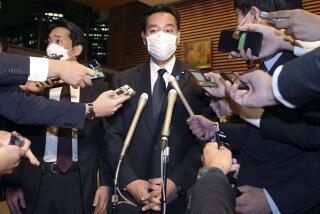PREVIEW / ASIAN OVERTURES : N. Korea Opens Door to Old Foe Japan : A high-level Tokyo delegation will visit Pyongyang to apologize for the past and talk of the future.
- Share via
TOKYO — Communist North Korea appears ready to open its door, at least a crack, to one of its most hated neighbors, Japan.
And Japan, for its part, is ready to apologize, at least partially, for its past abuses.
How far the door will open, how deeply the Japanese will bow in apology, and how much tensions in Northeast Asia might be reduced as a result will be revealed next week.
In a rare act of bipartisan Japanese diplomacy, Shin Kanemaru, 76, a former deputy prime minister and a kingpin of the ruling Liberal Democratic Party, will lead a mission of 13 of his party’s members of Parliament while Makoto Tanabe, 68, a Socialist deputy chairman, will lead a 10-member group from his opposition party on a visit to Pyongyang beginning Monday.
Setting Precedents
The five-day mission will be the first to include Japanese government officials, the first to fly directly to Pyongyang and the first headed by a politician as influential as Kanemaru, who is Prime Minister Toshiki Kaifu’s chief supporter.
Since 1965, when Seoul and Tokyo established their post-colonial era ties, Japan has maintained diplomatic relations only with South Korea. Tanabe, who arranged Kanemaru’s trip, and other Socialists have acted as Japan’s only pipeline to Pyongyang.
Likely Scenarios
The mission’s possible results, in descending order of probability, include:
An unofficial apology for Japan’s 1910-45 colonial rule of Korea before it was divided in 1945, and agreement that Pyongyang has a right to press monetary claims for compensation.
The release of two Japanese fishermen who were seized in 1983 as “spies” after a North Korean deserter stowed away on their ship to seek freedom in Japan. Kanemaru made their release a prerequisite for his trip.
Permission for North Korea to use Japanese satellite communications.
Establishment of “liaison offices” in Tokyo and Pyongyang functioning as de facto embassies.
Approval for periodic charter flights between the two countries.
Elimination of a ban on travel to North Korea that is stamped in the passports of ordinary Japanese. Travelers now must obtain special single-trip passports.
The beginning of negotiations and official contacts between the two governments.
Expanded trade and economic exchanges.
Key Issues
Kanemaru said he wants to “open a hole in the wall that separates Japan and North Korea.” But many North Koreans don’t want to tear down the wall. They say that full diplomatic ties with Tokyo, with its relations with Seoul, would recognize the division of Korea as permanent.
Japanese officials suspect that Pyongyang hopes to extract an apology, reparations, expanded trade and economic aid from Japan--all without establishing diplomatic relations.
Kanemaru is not expected to agree to that, although the idea for liaison offices--a Kanemaru suggestion--probably would lead to greater trade and economic aid.
In response to a North Korean demand for “a direct, clear apology from Japan’s highest official” for Japan’s colonial rule, Kanemaru is expected to take some kind of apology from Kaifu. Kanemaru hopes to deliver it directly to President Kim Il Sung, 78. So far, however, no appointment with Kim has been scheduled.
The ruling party kingpin said he would tell the leaders in Pyongyang that Tokyo is prepared to recognize their right to press claims against Japan. To a North Korean demand for future “economic cooperation,” Kanemaru said Japan will cooperate in the same way it did with South Korea after relations were normalized in 1965. But he mentioned no figures.
History of Aid
Japan agreed in 1965 to give South Korea $300 million in grants and $200 million in loans as “economic cooperation.” In the 25 years since then, an additional 645.5 billion yen ($4.6 billion) in governmental loans have been provided.
North Korean trade debts to private Japanese firms that climbed to 80 billion yen ($571.4 million) by 1983, when North Korea halted repayments, are a hurdle to expanding trade. Japan stopped approving government insurance of exports to North Korea seven years ago and says it won’t resume until Pyongyang agrees to repay the debt.
More to Read
Sign up for Essential California
The most important California stories and recommendations in your inbox every morning.
You may occasionally receive promotional content from the Los Angeles Times.













